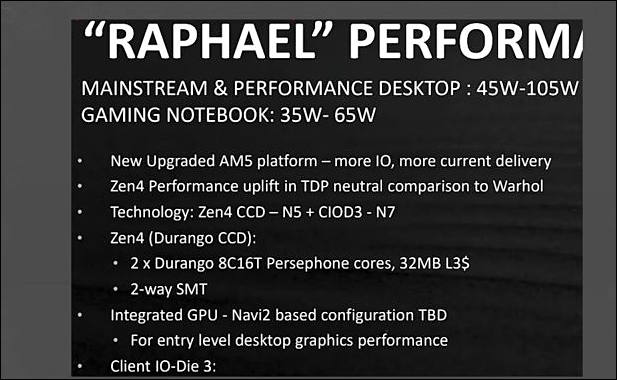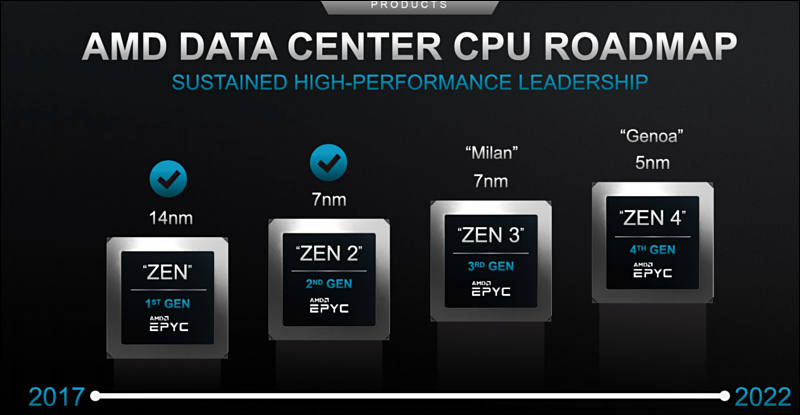
-
- The top SKU will be limited to 16 cores which implies two full compute tiles.
- Based on TSMC 5nm fabrication node
- 170w TDP (real thermal dissipation will reach 250-270 watts)
- DDR5 support
- LGA1718 socket aka AM5


 sa17678.jpg617 x 380 - 46K
sa17678.jpg617 x 380 - 46K -
Present industry rumors collected
- Performance per core increase will be below 4% and can be even negative
- Core counts per chiplet won't increase and will stay at 8 cores
- Cache size can increase by around 50-75%
- Chip will offer dual channel DDR5 support, AMD still having issues with memory controller
- AMD can restrict usage of external USB controllers and can ask for special license payment for such use
- TSMC have major issues with performance version of 5nm process (now only low power version is offered)
- AMD now has severe thermal issues, test chips can't reach even 3.5Ghz without thermal damage
- CPU prices will jump around 30-50% for same positioned model in lineup
- Chipset prices will jump 20-35%
- Motherboard prices will jump 25-45% due to components inflation and chipset price
- AMD will restrict features for entry level and mid level chipset very similar to Intel offerings
- AMD will turn all marketing to focus on mobile chips (around 80% of marketing expenses)
- AMD will also participate in the anti desktop marketing under green economy taglines (your desktop is major contributor of global warming)
AMD plans to migrate to the AM5 platform, bringing the new DDR5 and USB 4.0 protocols. The current aim of Zen 4 is to be extremely competitive among competing products and to bring many IPC improvements. Just like Zen 3 used many small advances in cache structures, branch prediction, and pipelines, Zen 4 is aiming to achieve a similar thing with its debut. The state of x86 architecture offers little room for improvement, however, when the advancement is done in many places it adds up quite well, as we could see with 19% IPC improvement of Zen 3 over the previous generation Zen 2 core. As the new core will use TSMC's advanced 5 nm process, there is a possibility to have even more cores found inside CCX/CCD complexes. We are expecting to see Zen 4 sometime close to the end of 2021.
Howdy, Stranger!
It looks like you're new here. If you want to get involved, click one of these buttons!
Categories
- Topics List23,992
- Blog5,725
- General and News1,354
- Hacks and Patches1,153
- ↳ Top Settings33
- ↳ Beginners256
- ↳ Archives402
- ↳ Hacks News and Development56
- Cameras2,367
- ↳ Panasonic995
- ↳ Canon118
- ↳ Sony156
- ↳ Nikon96
- ↳ Pentax and Samsung70
- ↳ Olympus and Fujifilm101
- ↳ Compacts and Camcorders300
- ↳ Smartphones for video97
- ↳ Pro Video Cameras191
- ↳ BlackMagic and other raw cameras116
- Skill1,960
- ↳ Business and distribution66
- ↳ Preparation, scripts and legal38
- ↳ Art149
- ↳ Import, Convert, Exporting291
- ↳ Editors191
- ↳ Effects and stunts115
- ↳ Color grading197
- ↳ Sound and Music280
- ↳ Lighting96
- ↳ Software and storage tips266
- Gear5,420
- ↳ Filters, Adapters, Matte boxes344
- ↳ Lenses1,582
- ↳ Follow focus and gears93
- ↳ Sound499
- ↳ Lighting gear314
- ↳ Camera movement230
- ↳ Gimbals and copters302
- ↳ Rigs and related stuff273
- ↳ Power solutions83
- ↳ Monitors and viewfinders340
- ↳ Tripods and fluid heads139
- ↳ Storage286
- ↳ Computers and studio gear560
- ↳ VR and 3D248
- Showcase1,859
- Marketplace2,834
- Offtopic1,320






